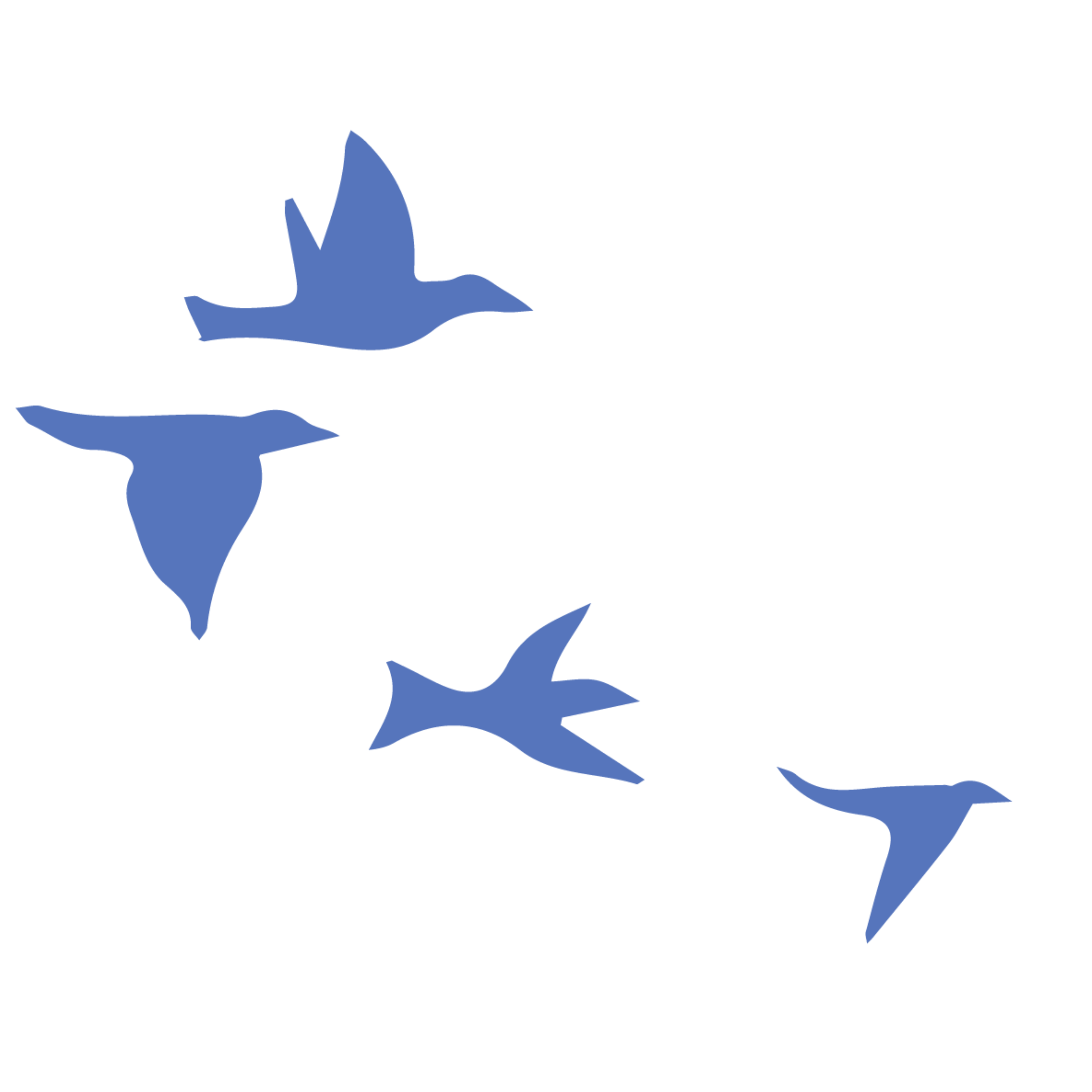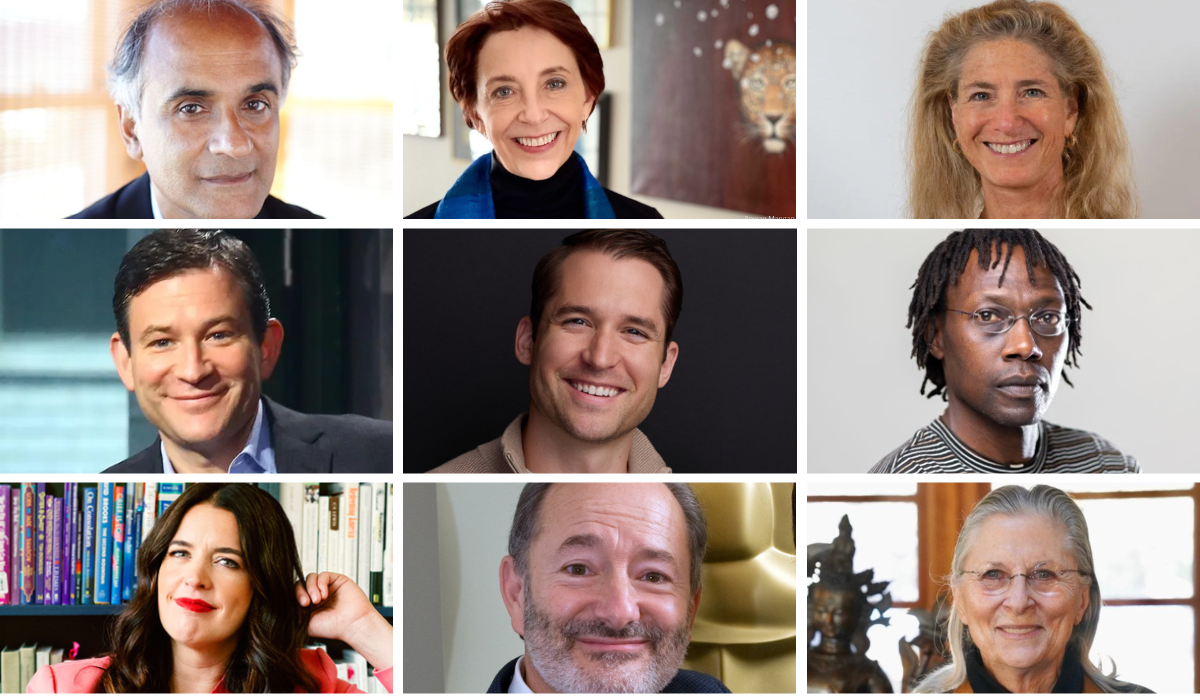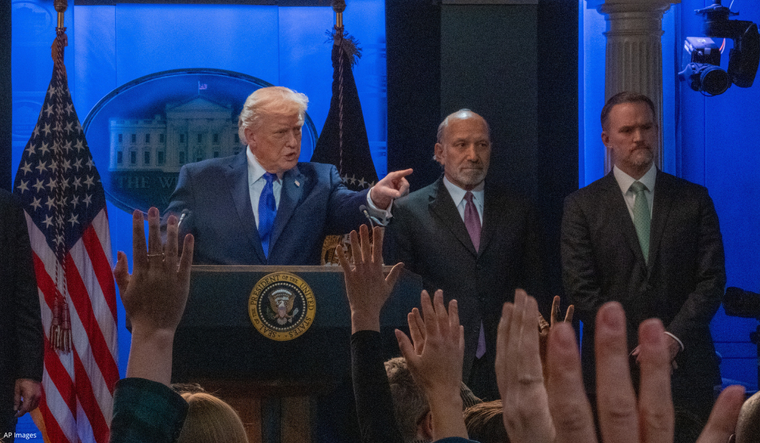Want to Find More Hope and Meaning Right Now?

In a world that feels more uncertain and turbulent than ever, many of us are searching for steady ground. We’re in need of practices that can help us feel more calm and connected to what truly matters.
Here at The Sunday Paper, we’re lucky to be able to call on some of the world’s greatest hearts and minds and ask for their advice when times get tough. How do they cope when they’re worried about the state of the world? What do they do when anxiety takes hold or conflict arises? And what can we learn from them about how to live with more intention, peace, and joy?
This week, we’ve gathered nine inspired practices from some of our go-to spiritual leaders, psychologists, authors, and thinkers—simple, yet powerful, shifts you can make to usher in more peace, hope, and meaning in your own life. Use them to reclaim your center if you’re feeling the weight of the world.
Pico Iyer, journalist and author of Aflame, on what to remember when you’re worried about the state of the world…
“When the Dalai Lama faces questions about what to do with our grief and loss, he always uses the phrase, wider perspective—whether it's wider in time or space. In the United States, I know so many of my friends over the last many years have been very worried about the state of the nation and, therefore, the state of the world. Then I go to China, India, and many other much larger countries, and people have such a sense of possibility. So, I always want to avoid having too narrow a perspective, both in terms of just being caught up in this moment and also just being caught up in my little life and failing to see all the improvements in the world and all the possibility.”
To read more from Pico Iyer, click here.
Martha Beck, PhD, world-renowned life coach and bestselling author, on what to do when you’re stuck in an anxiety spiral…
“Most people who are anxious don’t feel like being creative. But if you can start to do something creative, anxiety can’t function. What I’ve found in case after case—and I’ve talked to thousands of people about this—is that in the moment of creating something, anxiety goes away. And then we may pop out of that and come back into anxiety, but the anxious part of the brain doesn’t notice that it was calm for a while. Most people don’t really realize how powerful creativity is. But everybody knows that if you start taking constructive action, you’ll start to feel better. Just make something creative and the brain has to let go of its anxiety.”
To read more from Martha Beck, click here.
Tara Brach, meditation teacher, psychologist, and author, on staying present and grounded…
“The path to bringing love to our world begins by healing our inner divides. If we are willing and courageous enough to feel what's going on inside us, to really contact the feelings of personal deficiency, fear and vulnerability and be intimate with them, that's what gives us the capacity to be intimate with others. That's what gives us the capacity to look more closely at another and sense where they might be hurting and what it's like living in their circumstances. That's what lets us sense that another person, like ourselves, longs to feel safe, forgiven, loved or understood. Connecting with our own vulnerability with an embodied and kind presence is the very grounds of how compassion is cultivated: We start by opening with tenderness to our own inner experience, and then that space of tenderness naturally can include the pain and suffering of others.”
To read more from Tara Brach, click here.
Dan Harris, author of 10 Percent Happier, on the practice that’s helping him calm anxiety right now …
“I try to remember the expression, “Action absorbs anxiety.” I want to be clear: I am a flawed and fallible person. My factory settings are basically frosty New Englander. This doesn’t come naturally to me. But I’ve found that making it a practice has been really helpful. I try to notice when I have the urge to turtle up, to be cold, to isolate—and then I try to the best of my ability (and failing frequently, but not always) to lean in. Getting myself to fully engage can be uncomfortable, but it is ennobling and empowering. Making this a life practice is always helpful.
Another expression that’s not mine, but it’s something I’ve adopted: “Never worry alone.” We tend to approach our anxiety and anguish as a solo endeavor—but it’s much better to approach it as a team sport. The data are very clear that the No. 1 variable when it comes to human flourishing is not sleep, or exercise, or diet (although those things are very important). It’s the quality of your relationships. Why? Because stress is generally what kills us, and the best way to regulate stress is to have good relationships.”
To read more from Dan Harris, click here.
Roshi Joan Halifax, Zen priest and Buddhist teacher, on stewarding our own well-being …
“How can we metabolize our own sense of futility, helplessness, and fear right now? By doing beneficial things for others in a genuine way, not a privileged way. Maybe you don’t just give money to the homeless shelter, but you become part of the cook team or go down to the homeless shelter and serve meals. Maybe you can't stop the wars, but you can do your part to not contribute to fear-based psycho-social energy that is pervading our country and the world. Serving others, serving your community, is one way to do this.
Another factor I think is important is what I call self-stewardship. In our workaholic society, where our egos are identified with productivity, it's very important for us to steward our own well-being. I'm not talking about self-care in terms of going to the spa, but rather having the kind of awareness of what our limits are, of what our capacities are, and to engage in activities that are fundamentally life affirming. To do that, we must care for ourselves just as we would take care of a child or go to the doctor. Self-stewardship is essential for us to be civil citizens in a world that is so highly fragmented.”
To read more from Roshi Joan Halifax, click here.
Jefferson Fisher, author of The Next Conversation: Argue Less, Talk More, on what to do when conflict arises…
“I teach that arguments aren’t something to win—they’re something to unravel. When conflict arises, it’s easy to get stuck in a tug-of-war, each person pulling in their own direction and tightening the knot. But real communication begins when you stop pulling and start understanding.
The key is to identify the core struggle beneath the argument, just like finding the knot in a rope. I’ll often even tell someone during a difficult conversation, “Help me find the knot.”
When you have the patience and discipline to do that, you stop fighting against the person and start working through the issue. Because at its core, an argument isn’t just about the disagreement—it’s a window into what the other person is struggling with.”
To read more from Jefferson Fisher, click here.
Kate Bowler, PhD, New York Times bestselling author, award-winning podcast host, and professor at Duke University, on how to keep a soft heart during troubling times …
“I think so many of us would like to identify as being soft hearted, but we worry that it’s a liability right now. Shouldn’t we toughen ourselves up? Shouldn’t we get battle ready for a world that doesn’t equate tender heartedness with bravery, survival, or meeting reality head on?
But I think tender heartedness is the ability to stay not just broken, but broken open to the world around us. There’s so much pain that just breaks us. That’s the truth. There’s so much fear, too, and there are very good reasons to feel scared and overwhelmed right now. But I believe soft heartedness is one of the only ways that we can move forward. The alternatives are likely too heavy to bear.”
To read more from Kate Bowler, click here.
Peter Samuelson, producer and philanthropist, author of Finding Happy, on finding lasting happiness…
“What is short term happiness? What is medium term happiness? And what is long term happiness? Short term happiness is sitting on the couch with a tub of chocolate ice cream and a spoon and no one to bother you. Medium term happiness is the same, as many times as you would like it and without adverse consequences. But long-term happiness is different. It is the web that we weave. Long term happiness is, in large measure, about whether we have helped to lift up our world. Did we help to heal the world? Did we leave the world better on our watch than we found it? The ultimate accolade is those ripples on the pond. If you lift people up, if you put yourself out there, if you allow your empathy and your kindness to guide you and help other people, they then grow up and help other people, who then help other people, who then help other people. The ripples move across the pond. And that is eternal.”
To read more from Peter Samuelson, order his new book, Finding Happy.
Dr. Dixon Chibanda, author of The Friendship Bench, on where true healing in our communities begins…
“When we create space in our communities for people to feel comfortable with being vulnerable, that's when healing begins. Whether it's on a bench, in a coffee shop, or on a school ground, when you create that space, healing truly begins. And the most important thing about healing is you don't need to be trained as a psychiatrist or a psychologist. You do need some basic principles, but every human being has an inert ability to express empathy given the right circumstances and the right environment.”
To read more from Dr. Chibanda, click here.
Please note that we may receive affiliate commissions from the sales of linked products.



